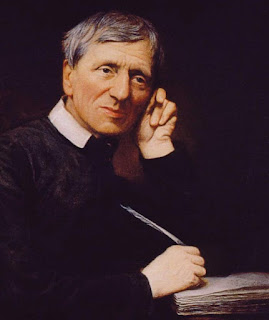First, some notes on Newman and the Papacy in general:
In June of 2019 I presented a paper on Newman's reactions to the First Vatican Council and the pending document on Papal Infallibility at Newman University during the Ad Fontes Conference hosted by Eighth Day Institute:
Newman received many letters from concerned converts and other Catholics. His advice was always to remain calm and pray. As he reminded himself and his correspondents, they had become Catholic because they believed “the present Roman Catholic Church is the only Church which is like, and it is very like, the primitive Church.”He recalled the phrase from St. Augustine: securus judicat orbis terrarum! and he relied upon the power of the Holy Spirit to keep the Church from any doctrinal error at a council. As Edward Short points out in Newman and His Contemporaries, he stressed to one of “his converts” when she threatened to leave the Church if Papal Infallibility was defined at the Council, “I say with [Robert] Cardinal Bellarmine whether the Pope be infallible or not in any pronouncement, anyhow he is to be obeyed. No good can come from disobedience . . .” He would make a similar comment in his Letter to the Duke of Norfolk. Newman did not think a decree of Papal Infallibility necessary or timely: he was an Inopportunist against the Ultramontanes. . .
When Pastor Aeternus was finally voted on, he was pleased to see that Papal Infallibility was narrowly defined; he waited to see how the dissenting bishops responded: securus judicat orbis terrarum! Newman made no public statement except to again deny rumours that he was going to leave the Catholic Church (he had to make these periodically!)
Only when William E. Gladstone, former Prime Minister, published The Vatican Decrees in Their Bearing on Civil Allegiance in 1874 did Newman respond in 1875 with his Letter to the Duke of Norfolk, addressing his counter-argument to the pre-eminent Catholic peer, Henry FitzAlan Howard, scion of a family with two martyrs (Philip Howard and William Howard) in its pedigree. Selecting the 15th Duke of Norfolk as his public correspondent was testing Gladstone’s main contention: that Catholics could not be loyal Englishmen if they accepted Papal Infallibility. Was the Earl Marshall of England, who happened to be a Catholic and a graduate of Newman’s Oratory School, not a loyal Englishman? Did Gladstone really mean that?
Only when William E. Gladstone, former Prime Minister, published The Vatican Decrees in Their Bearing on Civil Allegiance in 1874 did Newman respond in 1875 with his Letter to the Duke of Norfolk, addressing his counter-argument to the pre-eminent Catholic peer, Henry FitzAlan Howard, scion of a family with two martyrs (Philip Howard and William Howard) in its pedigree. Selecting the 15th Duke of Norfolk as his public correspondent was testing Gladstone’s main contention: that Catholics could not be loyal Englishmen if they accepted Papal Infallibility. Was the Earl Marshall of England, who happened to be a Catholic and a graduate of Newman’s Oratory School, not a loyal Englishman? Did Gladstone really mean that?
Besides, he reminded Gladstone, the Pope’s Infallibility is limited to speaking on matters of faith and morals as abstract doctrine and principles, not on individual decisions of what to do or not to do in a certain situation. . . .
In a later chapter, on “The Vatican Definition” Newman emphasizes that the Pope speaks infallibly only under certain conditions:
He speaks ex cathedrâ, or infallibly, when he speaks, first, as the Universal Teacher; secondly, in the name and with the authority of the Apostles; thirdly, on a point of faith or morals; fourthly, with the purpose of binding every member of the Church to accept and believe his decision.When the Pope is speaking his mind on any subject like the interpretation of scripture, economics, history, etc., he is not infallible because “he is not in the chair of the universal doctor.” Even if the Pope makes dogmatic statements in an encyclical, as Pope John Paul II did in The Gospel of Life, reiterating Catholic teaching against abortion, for example, those are not exercises of Papal Infallibility.
Since the definition of Papal Infallibility in 1870, only one Pope has used this power: Pope Pius XII when defining the doctrine of the Assumption of the Blessed Virgin Mary in 1950.
In spite of his reservations about the First Vatican Council's conduct, Newman accepted the work of the Council, but he knew that the Church--the whole Church, including the laity and the theologians, needed time to understand the theology and practice of the doctrine of Papal Infallibility. The First Vatican Council was abbreviated by the Franco-Prussian War and the cause of Italian unity, as the Italian Army was soon at the gates; the Papal States were lost and the long period the Pope as "the prisoner of the Vatican" began.
Image Credit: (Public domain): Papa Pio IX fotografato da Adolphe Braun in commemorazione dell'83° compleanno di Sua Santità (I'm not sure which knee Newman bumped!)
Image Credit: (Public domain): Henry Fitzalan-Howard, 15th Duke of Norfolk (1847-1917)


.jpg)
No comments:
Post a Comment